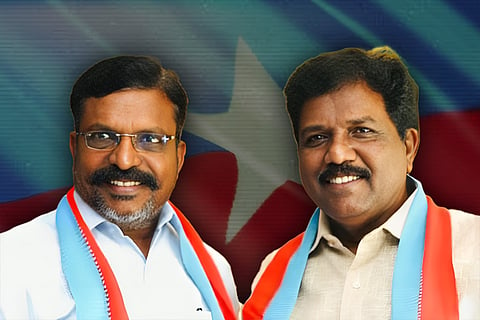

It is a 25-year-old dream come true, said Viduthalai Chiruthaigal Katchi (VCK) leader Thol Thirumavalavan as the party is tipped to gain recognition as a state party with wins in two Lok Sabha constituencies under their own ‘pot’ symbol. In the recently concluded Lok Sabha elections, the result of which was announced on June 4, VCK’s Thirumavalavan won from Chidambaram constituency and D Ravikumar from Villupuram constituency. The party has recorded a vote share of 2.25% as well.
Thirumavalavan, speaking to reporters on June 4, said that by winning two constituencies, the party has got a chance to get recognised as a ‘state party’ by the Election of Commission of India (ECI). “From 1999, we have been working to get recognition. This is a south Indian party, a movement which speaks Ambedkarite ideology. By getting the support of people and state recognition, we are being recognised as a party and a movement for everyone,” said Thol Thirumavalavan.
After a political party is formed, it can apply for registration to the ECI within thirty days of its formation, under section 29A (registration with the Election Commission of associations and bodies as political parties) of The Representation of the People Act.
Any registered political party can get recognised either as a ‘state party’ or ‘national party’. The parties that don’t get either recognition are classified as ‘registered (unrecognised) parties’. The recognition is given if the parties fulfil certain conditions laid out in The Election Symbols (Reservation and Allotment) Order, 1968.
Conditions for recognition as a ‘state party’
There are five conditions, in which one has to be fulfilled, for a party to be recognised as a ‘state party’. This is laid down in section 6A of The Election Symbols (Reservation and Allotment) Order, 1968. The conditions are:
In the last Assembly elections, the party should have secured at least 6% of the total valid votes polled in their state; and won in at least two constituencies (ie, have two MLAs); OR
In the last Lok Sabha election, the party should have secured at least 6% of the total valid votes polled in their state; and won in at least one constituency (ie, have one MP); OR
In the last Assembly election, the party should have won either 3% of the total seats in the Legislative Assembly or at least three seats, whichever is more; OR
In the last Lok Sabha election, the party should have won in at least one seat for every 25 seats allotted to that state (ie, at least one MP per 25 seats); OR
The party should have secured 8% of the total valid votes polled in their state either in the last Assembly or Lok Sabha elections.
Conditions for recognition as a ‘national party’
Section 6B of the same act puts forth three conditions, one of which should be fulfilled, for being recognised as a ‘national party’:
The party should have secured at least 6% of valid votes in four or more states either in the Lok Sabha or Assembly elections, along with having four MPs; OR
The party should have won at least 2% of the total number of Lok Sabha seats, along with having and the party ’s candidates should be elected from not less than three states; OR
The party should be recognised as a ‘state party’ in at least four states.
In the 2024 Lok Sabha elections, VCK fulfilled the fourth condition under section 6A by having two MPs being elected out of 39 seats in Tamil Nadu.
Based on the current figures provided by the ECI for 2024, vote share for the VCK in Tamil Nadu has almost doubled. The party has garnered 2.25% votes in two constituencies, as opposed to 1.17% in 2019. It is to be noted that in the 2019 elections, VCK leader D Ravikumar contested in Villupuram under its ally DMK’s ‘rising sun’ symbol and won by securing 49.25% of votes in that constituency. However, this could not be considered as the vote share of VCK.
A party worker told TNM that this is still a bone of contention for several cadres. “We could have easily got recognition last year itself. But we had to take the tactical decision,” he said.
The party emerged from the Dalit Panthers of India (DPI) movement in Maharashtra, which drew inspiration from the revolutionary Black Panther Party in the United States, and in 1990, the political movement was transformed into VCK, a political party. In 1999, the party entered electoral politics.
In the first ever General election the party contested in, VCK was in alliance with GK Moopanar’s Tamil Maanila Congress (TMC(M)). Thirumavalavan contested from Chidambaram and lost. But secured 2,25,768 votes, which was 31.17% of valid votes polled in that constituency.
In 2004, he contested as part of Janata Dal (United) alliance and lost, by securing 2,55,773 votes (34.40% of votes).
Becoming a state party comes with its own perks. A state party has a symbol reserved for it, which will be allotted to it each time. The candidate of a recognised state party needs only one person to endorse their nomination for elections, while an independent candidate or unrecognised party needs endorsement by 10 persons. Further, they can have up to 40 star campaigners, while unrecognised ones can have only 20. However, the recognition is subject to revision after every election, so the party must fulfil the conditions after every election.
Deputy general secretary Gautam Sanna said that it would have been easier to contest in all constituencies of Tamil Nadu and get the required vote share. “But it was a strategic decision that we made. We needed to be part of the government in order to bring a change. We did not initially focus on strength in numbers, we were focused on getting to power,” he said and added that now that the party shall be recognised, the party’s plan is to strengthen the party throughout Tamil nadu.